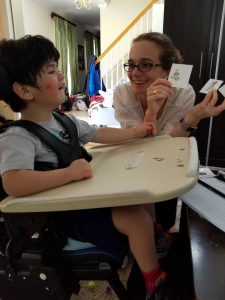 “I want to eat the mueberries!” I made the puppet say, “What rhymes with mueberries?” Joey scanned his hand over the two pictures of fruit on his tray – bananas and blueberries. Then, instead of handing me the picture like I expected he went into his words and said blueberries. “Exactly! Mueberries/Blueberries rhymes!” I celebrated, and then made my puppet pretend to eat up the mueberries while Joey looked on confused. I don’t think he appreciated my game although he was fine answering my rhyming questions.
“I want to eat the mueberries!” I made the puppet say, “What rhymes with mueberries?” Joey scanned his hand over the two pictures of fruit on his tray – bananas and blueberries. Then, instead of handing me the picture like I expected he went into his words and said blueberries. “Exactly! Mueberries/Blueberries rhymes!” I celebrated, and then made my puppet pretend to eat up the mueberries while Joey looked on confused. I don’t think he appreciated my game although he was fine answering my rhyming questions.
Years ago I read a research study that showed the correlation between children with a high phonological awareness in preschool and those who were successful readers. Children who had difficulty with phonological awareness often struggled with reading as they got older. The article also discussed that children who weren’t exposed to language opportunities that would develop their phonological processing (such as children from low income households who didn’t attend preschool) were predisposed to be struggling readers. Over the years this article stuck with me because it shows ways we can provide early intervention. We don’t need to be teaching young children to read, but we can be playing word and sound games with them to help them tune into our language.
As my teaching career went on I’d find myself continuing to think about this article and not just what it meant for kids from low-income families, but also what it means for children with disabilities. Often when we are working with children with developmental delays in early childhood we focus on the delay and forget to expose the child to what a typically developing child would be exposed to. It makes sense – we see a problem and we want to fix it. But what we don’t realize is that in doing so we are actively limiting opportunities for these kids. We might fix the delay, but by then the child has missed out on other opportunities.
I try to consistently remind myself of this when I plan lessons and activities for Joey. We can always work on how he uses his AAC device, or his motor control but I want to make sure he is exposed to the same material a typically developing child is exposed to.
To give him this opportunity we recently began playing rhyming games. Rhyming is truly a precursor skill to decoding unfamiliar words. What you really do when you create a rhyme is take away the first sound of a word and replace it with another sound. You have to hold that second part of the word in your head and then blend it with another initial sound. This is exactly the same skill required when you decode words later on. I often find that early on children have difficulty recognizing rhymes. Although it seems so basic to those of us who have been rhyming since before we can remember, our brains do not automatically register those similar ending sounds. They need to experience it over and over again, and in some cases need to have their attention directly drawn to those similar sounds.
Luckily, rhyming can also be extremely fun and silly to teach. Fun and silly is exactly what Joey likes. Next week’s post will cover different rhyming games Joey and I are playing.
*1 Kimberly G. Noble; Nim Tottenham; B. J. Casey, The Future of Children, Vol. 15, No. 1, School Readiness: Closing Racial and Ethnic Gaps.(Spring, 2005), pp. 71-89.
*2 Coch, D., Grossi, G., Coffey–Corina, S., Holcomb, P. J. and Neville, H. J. (2002), A developmental investigation of ERP auditory rhyming effects. Developmental Science, 5: 467–489

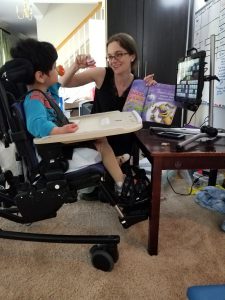 It’s appropriate that one of Joey’s current favorite books is
It’s appropriate that one of Joey’s current favorite books is 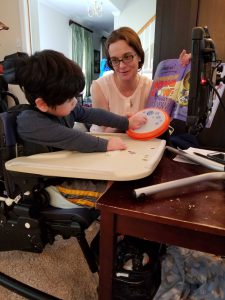
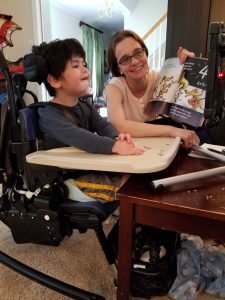 “How many dogs are there now?” I read aloud Joey, as we worked our way through one of our current favorite books,
“How many dogs are there now?” I read aloud Joey, as we worked our way through one of our current favorite books, 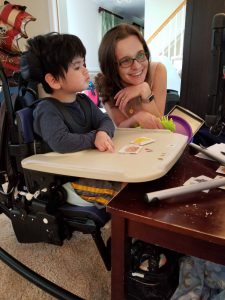 I was thrilled when my Journal of Early Intervention arrived this week with a study on the impact of sustained adult modeling of Augmentative Alternative Communication (AAC) with students with complex communication needs (CCN). I’m always excited to see AAC studies show up in special education journals. As the number of children are given access to AAC increases more studies are looking at how children develop language skills with AAC, and what are the best methods for teaching students to AAC. The more we know, the better we’ll be able to teach, so I quickly flipped open the study and read to see if it could help me in my work with Joey.
I was thrilled when my Journal of Early Intervention arrived this week with a study on the impact of sustained adult modeling of Augmentative Alternative Communication (AAC) with students with complex communication needs (CCN). I’m always excited to see AAC studies show up in special education journals. As the number of children are given access to AAC increases more studies are looking at how children develop language skills with AAC, and what are the best methods for teaching students to AAC. The more we know, the better we’ll be able to teach, so I quickly flipped open the study and read to see if it could help me in my work with Joey. 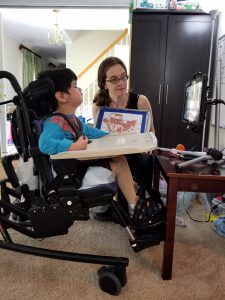 When I returned from my month away, Joey had all sorts of new words added to his device. At first I was surprised to see so many new words had been added in such a short period of time, but as I watched him maneuver around his screen I was excited by his growth. He seemed to quickly understand that these new words gave him a greater capacity to communicate with us.
When I returned from my month away, Joey had all sorts of new words added to his device. At first I was surprised to see so many new words had been added in such a short period of time, but as I watched him maneuver around his screen I was excited by his growth. He seemed to quickly understand that these new words gave him a greater capacity to communicate with us. 
